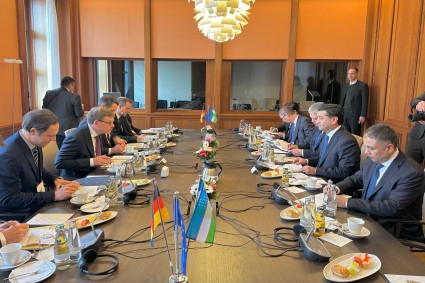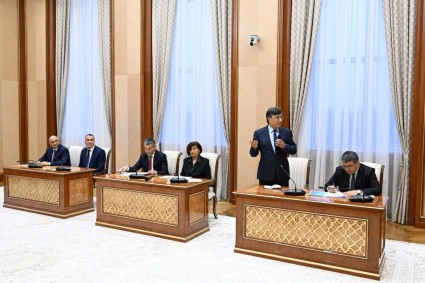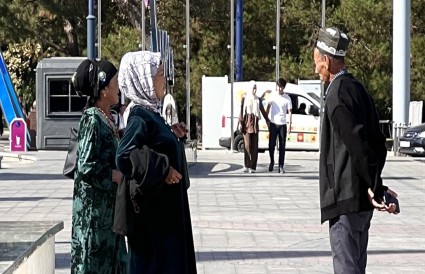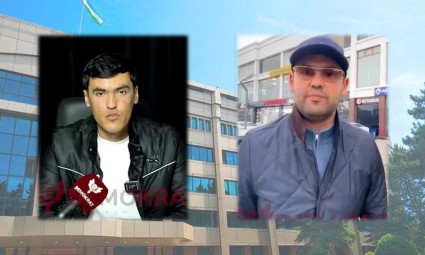Today, President Shavkat Mirziyoyev attended the first summit of the UN Special Program for the Economies of Central Asia (SPECA) in Baku, the presidential press service said.
The event, chaired by the President of Azerbaijan Ilham Aliyev, was attended by the Presidents of Kazakhstan Kassym-Jomart Tokayev, Kyrgyzstan Sadyr Japarov, Tajikistan Emomali Rahmon, Deputy Chairman of the Cabinet of Ministers of Turkmenistan Khojamyrat Geldimyradov, executive secretaries of the Economic Commission for Europe Tatyana Molchan and UNESCAP Armida Alisjabana, and Also honored guests are the Prime Ministers of Hungary Viktor Orban and Georgia Irakli Garibashvili, Secretary General of the Cooperation Council for the Arab States of the Gulf Jassim Al-Budaiwi.
At the beginning of his address, Shavkat Mirziyoyev congratulated all participants on the 25th anniversary of the program, which was established by the Tashkent Declaration in 1998, as well as the adoption of a separate resolution of the UN General Assembly dedicated to this significant date.
Shavkat Mirziyoyev emphasized that over these years, SPECA had demonstrated its relevance as an effective mechanism for regional partnership in achieving the Sustainable Development Goals.
, more than 400 projects were implemented as part of the program to expand cooperation in the trade, communications, transport and logistics, digitalization, energy, water resources, ecology, gender equality and others, strategies for trade facilitation and innovative development were adopted.
“Today, with the countries of the region, Azerbaijan, Georgia and Hungary, we are implementing major projects in the field of industrial cooperation and infrastructure. Joint investment companies have been created and mechanisms for financing projects have been established. Modern trade and logistics centers and special economic zones are being created in border areas,” the president underscored.
Drawing attention to the challenges and threats faced by the countries of the region in the context of global geopolitical instability, the Uzbek leader outlined a number of initiatives to strengthen regional cooperation within the framework of SPECA.
He pointed to the need to radically increase the efficiency of the work groups in the main areas of partnership and enhance the institutional foundations of the program.
He proposed, together with experts from the UN Economic Commission for Europe and ESCAP, to develop a SPECA-2030 Development Concept.
To stimulate intraregional trade, the head of state underscored the expediency of preparing a joint action plan, providing for the introduction of best practices in eliminating barriers and harmonizing measures for technical regulation of export-import operations.
The adoption of such measures, according to the leader of Uzbekistan, will allow increasing trade turnover in the SPECA region from the current 52 billion dollars to 100 billion by 2030, the share of industrial products in its structure - 70%.
The importance of creating and launching the SPECA Trust Fund next year to support large projects in the areas of green economy, innovation, high technology, logistics, alternative energy, smart agriculture, and the creation of modern social infrastructure was emphasized. “The Fund must actively work with international development institutions, attract financial resources and grant funds to priority projects and programs on the most favorable terms. Uzbekistan is also ready to make a financial contribution to the formation of the fund,” said Shavkat Mirziyoyev.
Speaking about the development of interconnected transport corridors, the President of Uzbekistan underscored the need to fully implement the “road map” adopted during the summit for the digitalization of the data exchange process within the Trans-Caspian multimodal corridor.
He voiced a proposal to hold the international forum “Digital Transport Corridors” in Uzbekistan next year.
The intention was also expressed, together with specialized UN institutions, to actively promote large projects to strengthen transport connectivity in the region.
The leader of Uzbekistan proposed creating a special high-level working group on ensuring food security within SPECA and holding its first meeting next year in Samarkand.
“The main agenda of the event will be the development of cooperative ties between leading agro-industrial enterprises, the creation of value chains, the stimulation of scientific and technological exchanges and the introduction of advanced resource-saving solutions, and the use of express corridors,” the head of state said.
Taking into account the interconnectedness of the spheres of water resources, energy, ecology and agriculture, the leader of Uzbekistan emphasized the importance of adopting a comprehensive new conceptual document of SPECA - a multilateral “Green Strategy”. According to UN research, countries in the region lose about $2 billion annually due to water shortages. In the future, if this negative process intensifies and there is no comprehensive solution to the problems, the water supply per capita may decrease by 25%, and crop yields by 40%, the president noted.
The head of state paid focused on gender equality and involving women in entrepreneurial activities. He proposed creating the SPECA Business Women's Council.
In addition, he announced an initiative to award, within the framework of the Council, the international prize “SPECA Recognition” to women who make a great contribution to the prosperity and economic development of the countries of the region.
Addressing his colleagues, the leadership of the Economic Commission for Europe and ESCAP, the leader of Uzbekistan called for establishing working contacts and restoring cooperation with Afghanistan within the framework of SPECA.
“Afghanistan should not be left alone with its problems. Without establishing an international dialogue with the current government, it will be impossible to achieve any positive result,” he highlighted.
At the end of his speech, Shavkat Mirziyoyev reiterated Uzbekistan’s commitment to multilateral partnership within the framework of the SPECA Regional Program for the sake of ensuring sustainable development and well-being of the peoples of the countries of the region.















